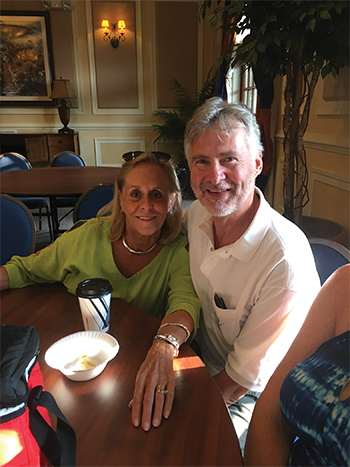Small Cell Lung Cancer Survivor
Having a positive attitude is everything

Heidi Hanson had already been treated successfully for breast cancer and bladder cancer before discovering she had Stage IV small cell lung cancer at 71. As a three-time cancer survivor, she knows how important it is to have a positive attitude. With the help of her family, support groups and GO2 for Lung Cancer, she encourages others with her natural hopefulness.
For about a week, I had been wobbly on my feet. I suspected it was allergies, but when it didn’t go away, I called my general practitioner. She recommended I go to the ER right away, which I did. They ran a battery of tests including an MRI and PET. One doctor asked me to touch my nose, and to my surprise, when doing so, I immediately threw up. I knew something was terribly wrong. The doctor said I would need to stay overnight for monitoring.
The next day, the doctor on call, who just happened to be the top neurosurgeon in our area, said scans showed a large mass in my brain that required surgery to remove it. I was shocked. I didn’t have much time to process the information before they rushed me into the operating room for a seven-hour surgery to remove the mass. It was the size of an orange in the lower stem of my brain. I spent two days in the ICU recuperating. The staff made sure I got up and could walk and talk before sending me home the next day. Then we waited for test results to identify the mass.
It took about a week to get results. In the meantime, I was referred to an oncologist. I suspected that my previous breast cancer or bladder cancer had returned and metastasized to my brain. I did not expect to hear I had a third cancer. The oncologist said that the cells in the mass were a metastasis from small cell lung cancer, which meant it was Stage IV.
The surgeon believed he removed all of the tumor in my brain. A scan immediately after the surgery showed a tumor in my right lung. The next steps included chemotherapy and five months of physical therapy to regain my balance and strength after the surgery. I never had them both on the same day. I also had brain radiation to kill any microscopic tumor cells left behind after the brain surgery. My oncologist also added immunotherapy to my regimen.
I tolerated the chemotherapy well with only a little bit of nausea. The only real change was losing my long blonde hair and having it grow back gray and curly. I think what helped me avoid some side effects was staying hydrated and moving.
At a follow-up appointment, a PET scan showed the tumor was completely gone. But later, a new spot was found in my right lung in a different location than the original. My radiation oncologist ordered several rounds of radiation therapy to my chest. Fortunately, I didn’t have chest radiation with my breast cancer diagnosis, so I was still eligible to have it.
When a recent scan still showed something on my lung, I was referred to a pulmonologist who did a biopsy and confirmed it was scar tissue from the previous radiation to my chest. I also have a brain MRI/PET every three months to help monitor my cancer. No matter what, it is crucial to stay on top of all appointments and follow-ups.
I have finished chemotherapy and radiation therapy, but I will remain on immunotherapy for as long as it keeps the cancer at bay. If I need to, I will definitely consider joining a clinical trial in the future.
While I went through treatment, my mother passed away. Five years earlier my husband was diagnosed with multiple myeloma and amyloidosis. He was enormously helpful and supportive because he had been through treatment himself. I made myself find support groups so that I would not feel alone. My social worker connected me with GO2 for Lung Cancer and LUNGevity. They helped me stay hopeful.
When you first find out you have cancer, it’s important to acknowledge it. You have to own it and speak it out loud. Then you can reach out for help and be a participant in your treatment. Being in denial is not helpful. This cancer can really make people isolate themselves, and support is vital for getting through everything.
Having a positive attitude and surrounding myself with friends and family made all the difference. My brother-in-law has been my rock through everything. He is an orthopedic oncologist, and I consulted him every step of the way. I’m also extremely grateful for my medical team. They are all wonderful! I feel blessed I had the best medical care.
When a doctor, nurse or social worker asks you how you are feeling, tell them the truth. I finally admitted to them that I was scared to death. Scanxiety is a real issue you may face when you’re waiting for test results for cancer that is notorious for coming back. I’ve found that distracting my attention until the results are ready is helpful. If the fear is unbearable, talk to your doctor about it.
Find what works best for you. And try to stay positive.


